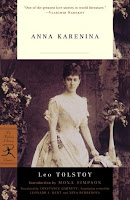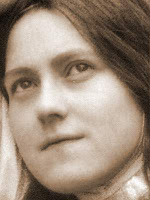Another Topic (warning: philosophy ahead!) (by Jacques)
"Happy families are all alike; every unhappy family is unhappy in its own way." -- Tolstoy, Anna Karenina
"Sinners are all alike; only saints attain true individuality." -- G.K. Chesterton (and that's a rough paraphrase, sorry.)
There's definitely a tension between those two ideas, but I don’t think they conflict. I think they’re two sides of the same coin.
 The Tolstoy quote is very anti-relativist. A relativist would say things like "well, this [e.g. living chastely] is right for me, but who am I to say whether it will make you happy? Everyone has to do whatever floats their own boat!" If you don’t want to be a relativist, you have to admit that because we are all human, what makes us all happy is the same thing. We can describe it, give a name to it: virtue. If all human beings share a common nature, then it must be the case that we share a common moral code, that murder and rape and so on are wrong for everyone and not just for some people, depending on the circumstances.
The Tolstoy quote is very anti-relativist. A relativist would say things like "well, this [e.g. living chastely] is right for me, but who am I to say whether it will make you happy? Everyone has to do whatever floats their own boat!" If you don’t want to be a relativist, you have to admit that because we are all human, what makes us all happy is the same thing. We can describe it, give a name to it: virtue. If all human beings share a common nature, then it must be the case that we share a common moral code, that murder and rape and so on are wrong for everyone and not just for some people, depending on the circumstances.The reason every unhappy family (or person) is unhappy in its (his) own way is because virtue makes up one complete whole. You need all the virtues to be truly happy. Thus, if someone is truly happy, we can reliably expect to find in him all the virtues, but if he is unhappy, he might be missing any number of things. One person might be unhappy because of lust, another because of greed, another because of envy and sloth combined...
 I would only disagree with Tolstoy if he means his statement to imply that happy families are boring, and only unhappy ones make interesting subjects for fiction. I don’t think Tolstoy would say that, but there are plenty of people around who would. It’s such a modern idea, that it’s only worth writing about [messed] up people, because goodness is boring. In actual fact, goodness is much more difficult to describe, because it’s rarer and more creative. Epic, as a genre, is more difficult than the modern novel because it describes heroes, while the novel describes people just like us, and it’s a lot harder to make your reader believe a hero than it is to make him believe someone who’s like people he meets every day. Very few people can actually predict what a wholly virtuous person would do in circumstances X or Y, because they confuse virtue with decency, or repression, or any one of a million other things that it isn’t. Flannery O’Connor said she only wrote about twisted people because she wasn’t a good enough writer to capture the reality of good people.
I would only disagree with Tolstoy if he means his statement to imply that happy families are boring, and only unhappy ones make interesting subjects for fiction. I don’t think Tolstoy would say that, but there are plenty of people around who would. It’s such a modern idea, that it’s only worth writing about [messed] up people, because goodness is boring. In actual fact, goodness is much more difficult to describe, because it’s rarer and more creative. Epic, as a genre, is more difficult than the modern novel because it describes heroes, while the novel describes people just like us, and it’s a lot harder to make your reader believe a hero than it is to make him believe someone who’s like people he meets every day. Very few people can actually predict what a wholly virtuous person would do in circumstances X or Y, because they confuse virtue with decency, or repression, or any one of a million other things that it isn’t. Flannery O’Connor said she only wrote about twisted people because she wasn’t a good enough writer to capture the reality of good people. What virtue is, is the full and complete flowering of a human personality, and as such it cannot help but be interesting. Chesterton is describing that other side of the coin. Yes, we all share a common nature, but it is also true that, as St. Therese said, "souls are as different as faces," and somehow we become more individual, not less, when we develop in virtue. The cardinal virtues are the same for everyone – prudence, justice, temperance, courage – but what they look like realized in a teacher is subtly different from what they look like in an accountant; what they look like in Dick is subtly different from what they look like in Jane. Goodness is not generic: it is the same for all men and yet unique to each individual. That is one of the greatest tensions, one of the greatest paradoxes, of the Christian life.
What virtue is, is the full and complete flowering of a human personality, and as such it cannot help but be interesting. Chesterton is describing that other side of the coin. Yes, we all share a common nature, but it is also true that, as St. Therese said, "souls are as different as faces," and somehow we become more individual, not less, when we develop in virtue. The cardinal virtues are the same for everyone – prudence, justice, temperance, courage – but what they look like realized in a teacher is subtly different from what they look like in an accountant; what they look like in Dick is subtly different from what they look like in Jane. Goodness is not generic: it is the same for all men and yet unique to each individual. That is one of the greatest tensions, one of the greatest paradoxes, of the Christian life. It's true each sinner may have his own preferred set of sins, but let's be honest, in this fallen world there are a lot more of us sinners than there are saints, and so sanctity is just for that reason surprising. We are barely even aware of what God could do with us, were he to bring us to the fulfillment of what our natures can be. We cling to our faults in the erroneous belief that they make us individual, distinguishing us from others, but that belief only means we have not begun to scratch the surface of who we are. We fear that if we became wholly virtuous, overcoming all our faults, we would be just like everyone else, but we fail to realize that evil is only the privation of good, that a vice is a lack of something rather than a real thing in itself, and that what distinguishes us as individuals ought to be positive and not merely negative. It is far better to be defined by strengths than by weaknesses.
It's true each sinner may have his own preferred set of sins, but let's be honest, in this fallen world there are a lot more of us sinners than there are saints, and so sanctity is just for that reason surprising. We are barely even aware of what God could do with us, were he to bring us to the fulfillment of what our natures can be. We cling to our faults in the erroneous belief that they make us individual, distinguishing us from others, but that belief only means we have not begun to scratch the surface of who we are. We fear that if we became wholly virtuous, overcoming all our faults, we would be just like everyone else, but we fail to realize that evil is only the privation of good, that a vice is a lack of something rather than a real thing in itself, and that what distinguishes us as individuals ought to be positive and not merely negative. It is far better to be defined by strengths than by weaknesses.Whew, this post is getting long, and I still feel like I'm articulating myself poorly. I think I just realized that this topic might be a little bigger than my blog can handle...
Thank you, Jacques, for the thoughts. You may be studying Plato, but--whoa!--that was some hefty Aristotle! Much love, etc., the Philosopher Mom et alia.
No comments:
Post a Comment